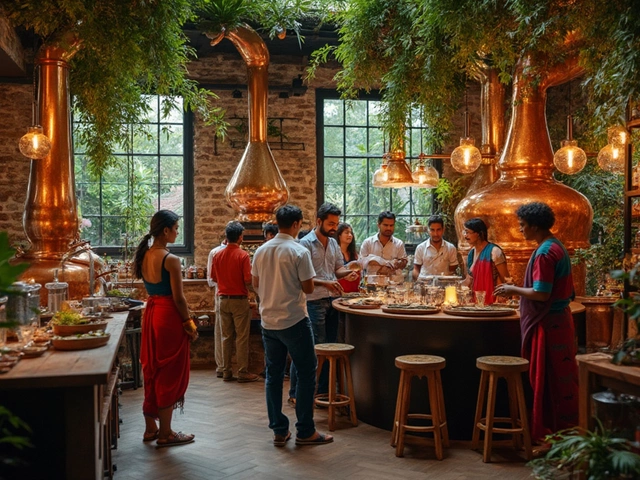
You can’t scroll through social media these days without seeing someone sipping a trendy, colorful drink that promises to help you chill out, perk up, or find some kind of magic middle ground. These are adaptogen drinks, and they’re cashing in on the idea that you don’t need alcohol to unwind—or even catch a buzz. But let’s be honest: how many times have you wondered if these drinks are doing anything at all, or if it’s just creative branding?
If you’re hunting for mocktail ideas that actually make you feel something, the world of adaptogen drinks can be confusing. Just because something’s labeled “mood-boosting” or “energy-lifting” doesn’t mean you’ll be bouncing off the walls (or sinking into the couch). So what’s really going on when you drink them? Are those tingly, cozy, or clear-headed moods legit effects, or is your brain playing tricks?
- What Are Adaptogen Drinks, Really?
- Do They Actually Make You Feel Anything?
- Surprising Ingredients and What They Do
- Making Better Mocktails with Adaptogen Drinks
What Are Adaptogen Drinks, Really?
Adaptogen drinks sound a bit mysterious, but they’re honestly just any beverage with plant-based ingredients called adaptogens, which are supposed to help your body deal with stress. The big idea is that these drinks can make life’s chaos less intense, all without alcohol, caffeine, or sugar highs. You’ve probably seen names like ashwagandha, reishi, schisandra, and holy basil on labels—these are the “famous” adaptogens and have been used in Ayurvedic and traditional Chinese medicine for ages.
But here’s what’s key: adaptogens aren’t a magic fix. They’re plants and mushrooms that may help your body adapt to stress or imbalance, but research in humans is still new and sometimes exaggerated by marketing. In the world of adaptogen drinks, you might spot these ingredients blended with sparkling water, teas, or fruit juice to make them taste better and look pretty in your glass.
Honestly, most commercial adaptogen drinks skip any added sugar, artificial flavors, or preservatives. Brands want to be seen as ‘clean’ or ‘wellness-focused.’ If you check the ingredients, you’ll usually see a mix of:
- Adaptogenic herbs or mushrooms (like ashwagandha powder, reishi extract, ginseng)
- Botanicals for flavor (think lemon balm, hibiscus, rosemary)
- Sometimes vitamins or minerals
The big takeaway? These drinks aren’t meant to knock you out or wind you up in the way cocktails or energy drinks do. The goal is more of a gentle nudge—feeling a little calmer or clearer—if the herbs work for you at all. Don’t expect fireworks, but they do give you some new flavors to play with in your next mocktail.
Do They Actually Make You Feel Anything?
Here’s something everyone wants to know: Will you really notice a difference after sipping an adaptogen drink, or are companies just leaning hard on wellness buzzwords? In all honesty, the answer isn’t as simple as yes or no. It depends on what’s inside, how much you actually drink, and your body’s own chemistry.
The word "adaptogen" covers a handful of plant-based ingredients that have been studied for their effects on stress and mood. Some, like ashwagandha and reishi mushroom, have shown in small, controlled studies to help the body manage stress better. Others, like schisandra berry, pop up in traditional remedies but don’t have tons of modern research to back those big claims.
So, will you feel a buzz? In most cases, you won’t get the quick headrush you’d expect from alcohol or caffeine. Adaptogen drinks tend to work subtly. Instead of a jolt, you might notice a gentle sense of calm, or you might just feel more focused without being jittery. Sometimes, people even feel nothing at all after one drink. The most real results usually come when you have these drinks regularly, not just for one night out.
Here’s a snapshot of the most common feelings reported by people trying these drinks:
- Calmness without drowsiness (ashwagandha, reishi, holy basil)
- Mild focus or mental clarity (lion’s mane mushroom, rhodiola)
- Improved mood or a light energy lift (schisandra, maca)
To put things in perspective, check out this quick rundown of what people actually report after trying a adaptogen drink versus drinking alcohol or caffeine:
| Drink Type | Typical Feeling | Kick-in Speed |
|---|---|---|
| Adaptogen Drink | Mild calm/focus, varies by ingredients | 20-40 minutes, sometimes subtler |
| Alcohol | Buzz, looseness, disinhibition | 10-30 minutes, usually obvious |
| Caffeinated Mocktail | Alert, energetic, sometimes jittery | 15-30 minutes, noticeable |
So if you’re reaching for an adaptogen mocktail expecting the same punch as a cocktail, you might be let down. But if you want a drink that could take the edge off or help you stay present, there’s a chance you’ll feel just that, especially with the right mix. Listen to your body—some folks are more sensitive, some less. It’s not magic, but it’s more than just fancy water—if you stick with the real stuff and don’t expect fireworks from the first sip.

Surprising Ingredients and What They Do
Adaptogen drinks aren’t usually just one herb dumped in sparkling water. There’s a whole mix of ingredients—some are famous in herbal circles, and some sound straight-up weird if you’re new to the scene. Each one claims to support your mood or help your body handle stress in its own way. But how much do they really do? Let’s break down some common stars you’ll spot on adaptogen drink labels.
- Ashwagandha: This root is big in Ayurveda. It’s believed to help with stress and boost your sense of calm. Some people say they feel less frazzled after a week or two of using it. That’s not instant magic—think of it like yoga for your nervous system, but in liquid form.
- Rhodiola: Often found in blends meant to “energize” you. Research from a 2023 review showed it helped people feel less tired during busy days, but don’t expect caffeine vibes. It’s more like a gentle nudge.
- Lion’s Mane: This mushroom is trending hard for its brain-supporting effects. Early studies suggest it might help with focus, but not in a jittery, wild-eyed way. You might just feel a bit more “on it” after regular sips.
- Reishi: Nicknamed the “chill-out mushroom.” It’s meant to support deeper sleep and ease tension. You won’t notice a heavy sedative effect, but some mocktail fans swear by a reishi nightcap.
- L-Theanine: Found naturally in green tea. This amino acid is known for promoting relaxation without making you sleepy, so it often lands in “calm” blends.
A lot of these sound mystical, but there’s actual research backing up some claims—just not usually at the Insta-influencer hype level. Here’s a quick look at how some ingredients stack up based on the research so far:
| Ingredient | Main Effect | Time to Feel Effects | Notable Research/Notes |
|---|---|---|---|
| Ashwagandha | Stress Relief | 7-30 days | 2021 clinical review found lowered cortisol in most users |
| Rhodiola | Mild Energy Boost | 1-2 weeks | 2023 meta-analysis: Improved fatigue in high-stress jobs |
| Lion's Mane | Focus/Clarity | 2-4 weeks | Small studies: Better concentration, needs more research |
| Reishi | Calm/Sleep Support | Several days | Some sleep improvements in healthy adults, not dramatic |
| L-Theanine | Relaxation | 30-60 min | Well-documented, works fastest and can work after just one drink |
It’s not just about the herbs or mushrooms, either. Companies often toss in things like sparkling water, fruit juices, or botanicals (think hibiscus, ginger, or mint) for flavor, because let’s face it, nobody wants their mocktail to taste like dry dirt. Just a heads-up: most of these drinks aren’t meant to knock you out or leave you wired. At best, you’ll notice a subtle shift, especially if you’re a regular and stick to them for a while. The real “buzz” from adaptogen drinks is more about dialing things back than tuning anything up.
Making Better Mocktails with Adaptogen Drinks
Building mocktails with adaptogen drinks is honestly a game-changer, especially if you’re searching for flavors and effects that stand out from the usual soda or juice combos. You don’t need to be a mixologist, either. Some adaptogen blends, like those with ashwagandha or reishi, have earthy or nutty flavors that can totally switch up a boring mocktail.
But it’s not all about taste. Some brands pay attention to dosing, aiming for effects in the 200-400 mg range for ingredients like ashwagandha—enough for potential benefits, but not so much that you’ll feel weird. A lot of store-bought adaptogen drinks blend functional mushrooms, roots, and even L-theanine (an amino acid from green tea known for calming effects) in the mix. That’s why you see names like Kin Euphorics or Recess popping up in recipes, promising an experience that’s different from plain old seltzer.
"Adaptogens aren’t about the instant kick you get from caffeine or alcohol; it’s more of a gradual effect that some people notice after a full can or two," says dietitian Maya Feller, MS, RD. "Pairing them with familiar flavors makes them way more enjoyable—and you might even feel more relaxed or alert, depending on what blend you pick."
If you're trying to craft your own mocktail, start simple. Here are a few ideas that reliably work:
- Mix an adaptogen drink with sparkling water and fresh citrus. Lemon or grapefruit slices help cut any bitterness and keep it refreshing.
- Pair earthy adaptogens like reishi or maca with ginger beer or pineapple juice for a tropical feel.
- Add a sprig of mint or basil when serving. A tiny bit of fresh herb goes a long way in making a glass feel special.
- Try a simple swap in classic recipes—use an adaptogen-based beverage in place of tonic or club soda for a fun twist on a G&T (without the gin).
Here’s a quick cheat sheet comparing popular adaptogen brands so you can pick the right one for your mood or event:
| Brand | Main Adaptogens | Flavor Notes | Reported Effects |
|---|---|---|---|
| Kin Euphorics | Ashwagandha, Rhodiola, L-Theanine | Herbal, slightly bitter | Relaxation, social vibe |
| Recess | American Ginseng, L-Theanine | Light, fruity | Focus, calm energy |
| Hiyo | Ashwagandha, Cordyceps, Lion’s Mane | Crisp, citrusy | Uplifted mood |
The cool thing is, you can mix and match these for your own signature drink. Just remember, the effects are more subtle than what you’d expect from booze. But that’s kind of the point—adaptogen drinks are about feeling good without the hangover. Next time you're stocking up for a party or just want to unwind on a random Tuesday, pick an adaptogen drink and play with flavors until you hit the perfect vibe.





Categories